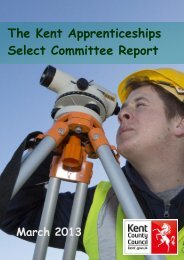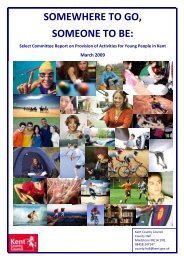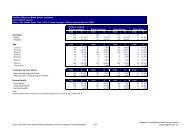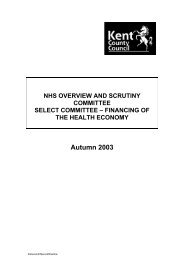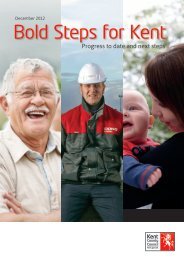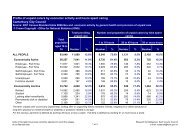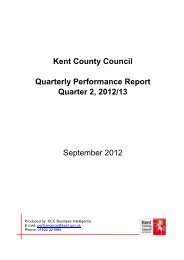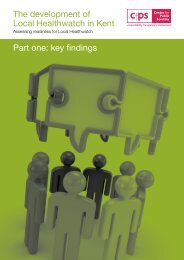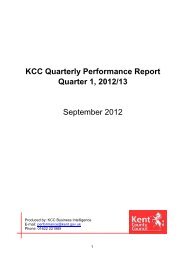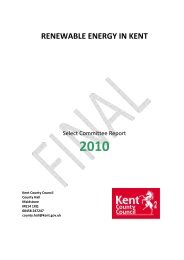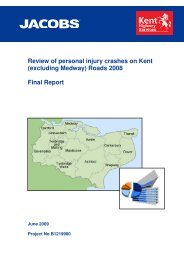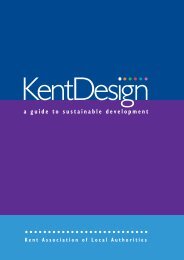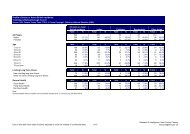makingithappen071112 - Kent County Council
makingithappen071112 - Kent County Council
makingithappen071112 - Kent County Council
You also want an ePaper? Increase the reach of your titles
YUMPU automatically turns print PDFs into web optimized ePapers that Google loves.
‘Valuing People Now’<br />
Making<br />
happen in <strong>Kent</strong><br />
Summary of the Partnership Strategy<br />
for Learning Disability in <strong>Kent</strong> 2012 - 2015
Making ‘Valuing People Now’ happen in <strong>Kent</strong><br />
Foreword by the <strong>Kent</strong><br />
Partnership Board<br />
<strong>Kent</strong> has had a very active Learning Disability Partnership<br />
Board for the past 10 years. Over this time, many good<br />
things have happened with and for people with learning<br />
disabilities in <strong>Kent</strong>. There have been many different plans,<br />
people and groups that have made these things happen but<br />
often working away from each other and not always in full<br />
partnership.<br />
The Partnership Strategy for Learning Disability in <strong>Kent</strong><br />
2012-2015 is a very important document that will help <strong>Kent</strong><br />
<strong>County</strong> <strong>Council</strong> and partners work together for a better<br />
future for people with learning disabilities who live in <strong>Kent</strong>.<br />
This summary sets out the vision and commitments central<br />
to the strategy.<br />
Penny Southern<br />
Director of Learning Disabilities<br />
and Mental Health<br />
The <strong>Kent</strong> Learning Disability Partnership Board endorses<br />
this strategy and recognises this as the main plan for people<br />
with learning disabilities in <strong>Kent</strong>. The Board looks forward to<br />
working with all partners to make sure that the challenges<br />
and changes shown in this strategy are clearly planned, acted<br />
on and achieved. We hope this will mean that more people<br />
with learning disabilities who live in <strong>Kent</strong> experience living<br />
their life the way they choose.<br />
Tina Walker<br />
Co-Chair of <strong>Kent</strong> Learning<br />
Disability Partnership Board<br />
<strong>Kent</strong> <strong>County</strong> <strong>Council</strong><br />
Families and Social Care<br />
Brenchley House<br />
123/135 Week Street<br />
Maidstone<br />
<strong>Kent</strong><br />
ME14 1RF<br />
The full version of the Partnership<br />
Strategy for Learning Disability in<br />
<strong>Kent</strong> 2012-2015 is available at<br />
www.kent.gov.uk/ldplansforkent<br />
Making<br />
‘Valuing People Now’<br />
happen in <strong>Kent</strong><br />
Graham Gibbens<br />
Co-Chair of <strong>Kent</strong> Learning<br />
Disability Partnership Board<br />
08458 247 100<br />
Partnership Strategy for Learning<br />
Disability in <strong>Kent</strong> 2012 - 2015<br />
2<br />
3
Making ‘Valuing People Now’ happen in <strong>Kent</strong><br />
Valuing People Now<br />
The local picture in <strong>Kent</strong><br />
‘Valuing People Now’<br />
Making<br />
happen in <strong>Kent</strong><br />
This is a summary of the Partnership<br />
Strategy for Learning Disability in <strong>Kent</strong> for<br />
2012-2015, which sets out the priorities<br />
for making sure that people with learning<br />
disabilities are getting the services they<br />
need.<br />
It is called a Partnership Strategy because it<br />
involves everyone working together. It was<br />
developed by commissioners from <strong>Kent</strong> <strong>County</strong><br />
<strong>Council</strong> and NHS <strong>Kent</strong>, along with input from<br />
service users, their families and carers, service<br />
providers and other professionals.<br />
This summary includes the major points in the strategy<br />
but not all of the details.<br />
The full strategy is available at<br />
www.kent.gov.uk/ldplansforkent and<br />
www.kcc.cswebsites.org/default.aspx?page=27721<br />
Valuing People Now is the national strategy<br />
for learning disability. It is based on four<br />
key principles:<br />
• Rights<br />
People with learning disabilities and their<br />
families have the same human rights as<br />
everyone else<br />
• Independent living<br />
This does not mean living on your own or<br />
having to do everything yourself. All disabled<br />
people should have greater choice and control<br />
over the support they need to go about<br />
their daily lives; greater access to housing,<br />
education, employment, leisure and transport<br />
opportunities and to participation in family and<br />
community life<br />
• Control<br />
This is about being involved and in control<br />
of decisions made about your life. This is not<br />
usually doing exactly what you want, but is<br />
about having information and support to<br />
understand the different options and their<br />
implications and consequences, so people can<br />
make informed decisions about their own lives<br />
• Inclusion<br />
This means being able to participate in all the<br />
aspects of community – to work, learn, get<br />
about, meet people, be part of social networks<br />
and access goods and services – and have the<br />
support to do so<br />
The current coalition government are continuing<br />
with this strategy and have identified health,<br />
housing and employment as the priority areas.<br />
It is important that these principles are also<br />
included in our Partnership Strategy for Learning<br />
Disability in <strong>Kent</strong>.<br />
In <strong>Kent</strong> there are:<br />
• probably about 28,000 people with<br />
learning disabilities but it is difficult<br />
to tell because not all of them need<br />
services<br />
• 4,100 people with learning<br />
disabilities who are known to <strong>Kent</strong><br />
<strong>County</strong> <strong>Council</strong> (KCC)<br />
In future, these numbers are expected to grow<br />
because people are living longer due to healthier<br />
lifestyles and better medical attention.<br />
People with learning disabilities often live with their<br />
families or in registered care homes but some live in<br />
their own homes. If they need support, this usually<br />
comes from service providers, which may be private<br />
or voluntary organisations. This is often arranged<br />
and paid for by the National Health Service (NHS) or<br />
KCC but in some cases, people are given the money<br />
so that they can purchase the support they need<br />
themselves.<br />
There is more detailed information about numbers<br />
of people with learning disabilities in the <strong>Kent</strong><br />
Learning Disability Needs Assessment.<br />
4 5
Making ‘Valuing People Now’ happen in <strong>Kent</strong><br />
Our vision - enhancing independence<br />
Our ten commitments<br />
The vision driving the Partnership Strategy for Learning Disability in <strong>Kent</strong> is to work with our partners to<br />
provide information and quality services in a personalised way so that each individual is able to access the<br />
support they need, delivered in a way that enhances their independence. We will look for outcomes for<br />
people so that we can tell if their services are working for them.<br />
Personalisation<br />
We will continue to use person centred planning, along with<br />
family support or advocacy, to determine what each person wants<br />
or needs and support them to make choices about how best to<br />
achieve it.<br />
Five keys to enhancing independence<br />
Our strategy will focus on five key areas that will be important to help people gain greater<br />
independence:<br />
1 Citizenship<br />
Being treated as an equal citizen in society and supported to enact your rights and fulfil your<br />
responsibilities<br />
2 What you do<br />
Having a fulfilling life of your own, including opportunities to work, study, enjoy leisure and social<br />
activities and to have relationships and friendships<br />
3 Where You live<br />
Real choice over where you live and with whom<br />
4 Health<br />
Mainstream health services providing you with appropriate, effective and accessible health care<br />
5 Partnerships<br />
Promote partnership working to encourage innovation and improve efficiency<br />
Support for carers<br />
Safeguarding<br />
Health<br />
Transition<br />
Accommodation<br />
solutions<br />
We recognise the important role that families and carers play in<br />
enriching the lives of people with learning disabilities and will<br />
support them to contribute their expertise.<br />
We will work with partners, including the police and criminal justice<br />
system to safeguard vulnerable people and, if they are victims of<br />
crime, ensure they have access to justice and support.<br />
We will continue to work with our Health partners to ensure that<br />
mainstream health services are equipped to meet the needs of<br />
people with learning disabilities.<br />
We will work in partnership with education and children’s services<br />
to support individuals with a smooth transition into adulthood.<br />
We will promote choices for the most appropriate housing for<br />
people with learning disabilities and will work with providers to<br />
ensure they are able to provide personalised services.<br />
Employment<br />
We will encourage innovation in employment support services and<br />
support social enterprises that seek to provide employment for<br />
people with learning disabilities.<br />
Including everyone<br />
We will work to ensure that personalised services are available for<br />
everyone, whatever their background or level of disability.<br />
Partnerships<br />
We will work with new and existing partners in the public, private<br />
and voluntary sectors to find innovative ways to deliver the<br />
elements of this strategy.<br />
Measuring Outcomes<br />
We will monitor and review progress toward the key elements of<br />
this strategy to ensure that we are achieving our targets and to<br />
provide analysis of the outcomes they are producing for individuals.<br />
6 7
Making ‘Valuing People Now’ happen in <strong>Kent</strong><br />
Commitments and actions<br />
Commitment 1: Personalisation<br />
We will continue to support use of person centred planning,<br />
along with family support or advocacy, to determine what each<br />
person wants or needs and support them to make choices about<br />
how best to achieve it.<br />
• review respite services in order to improve efficiency, availability<br />
and increase the occupancy rate. Ensure that they can safely<br />
accommodate the needs of a wider range of people<br />
• continue to support carers to engage with organisations in their<br />
communities and sponsor local carer support groups<br />
Living on my own<br />
Personalisation is about people having more choice and control<br />
over their lives and the services they receive, with support tailored<br />
to their needs rather than requiring the individual to fit into existing<br />
services.<br />
Self directed support allows the individual to take control in<br />
deciding the support they need and how it is delivered and paid for.<br />
Over the next three years we will:<br />
• look at developing more individualised, local solutions. Use<br />
approaches such as co-production to design and deliver services<br />
in an equal and reciprocal relationship between professionals,<br />
people using services, their families and their neighbours<br />
• ensure the process for setting personal budgets is transparent and<br />
give people appropriate support to purchase their own services<br />
while ensuring that they have real power to make the choice<br />
• increase the number of direct payments to learning disability<br />
clients to 50%<br />
Keeping me safe<br />
Commitment 3: Safeguarding<br />
We will work with partners, including the police and criminal<br />
justice system to safeguard vulnerable people and, if they are<br />
victims of crime, ensure they have access to justice and support.<br />
KCC considers the safeguarding of vulnerable children and adults<br />
one of its most important functions. In order to be as responsive as<br />
possible, KCC has a number of procedures in place designed to alert<br />
staff to issues relating to the quality of care people are receiving.<br />
These procedures will contribute to the monitoring of outcomes<br />
related to all of the rest of our strategy.<br />
Over the next three years we will:<br />
• maintain a close relationship with the Care Quality Commission to<br />
review risks and ensure follow up of any concerns<br />
• use the Safeguarding Vulnerable Adults competency framework<br />
to evidence the competence of community teams to deal with<br />
safeguarding issues<br />
Commitment 2: Support for carers<br />
We recognise and value the important role that families and<br />
carers play in enriching the lives of people with learning<br />
disabilities and will support them to contribute their expertise.<br />
• use the Quality in Care framework to engage with other authority<br />
commissioners when safeguarding concerns are raised in services<br />
where KCC has not placed people<br />
Support for my family<br />
The provision of short breaks is often cited as the single most<br />
important issue by carers both in terms of their own quality of life<br />
and their capacity to continue in their caring role. Feedback from<br />
individuals and people with learning disabilities indicates that a<br />
choice of short term break options is a requirement for the future.<br />
Commitment 4: Health<br />
We will continue to work with our health partners to ensure that<br />
mainstream health services are equipped to meet the needs of<br />
people with learning disabilities and will strive to work toward<br />
reducing health inequalities.<br />
Over the next three years we will:<br />
• feed into the Carers’ Implementation Plan to deliver the <strong>Kent</strong><br />
Carers’ Strategy, ensuring that we are commissioning services that<br />
meet the needs of carers of people with learning disabilities<br />
Having a healthy lifestyle<br />
Our strategy is to work with mainstream health services to provide<br />
good, accessible services for adults with learning disabilities, and to<br />
ensure all planning includes this group of people. We will continue<br />
to engage with GP surgeries to encourage Annual Health Checks,<br />
which have produced positive health results for many people.<br />
8 9
Making ‘Valuing People Now’ happen in <strong>Kent</strong><br />
<strong>Kent</strong> Transition Protocols<br />
‘Supporting disabled young people<br />
from adolescence to adulthood’<br />
Handbook for families<br />
October 2008<br />
Over the next three years we will:<br />
• contribute to meeting and evidencing the targets of the South<br />
of England Strategic Health Authority Learning Disability Self<br />
Assessment Framework<br />
• continue to work with Local Involvement Networks (LINks) and<br />
support their transition into Local HealthWatch organisations<br />
• ensure that electronic reporting systems will allow accurate<br />
recording and checking of people’s access to health checks and<br />
other health screening programmes<br />
Commitment 5: Transition<br />
We will work in partnership with education and children’s services<br />
to identify gaps in transition services and facilitate solutions.<br />
A good transition plan is key to assisting a person to move into<br />
adulthood and should provide opportunities to make choices about<br />
further education, employment and where to live. Families and<br />
people with learning disabilities have said that their outcomes from<br />
transition are often not as good as for other people and we need to<br />
work to improve this.<br />
Over the next three years we will:<br />
• work to maintain strong links with professionals who are<br />
responsible for placements out of county schools, independent<br />
schools, specialist units in mainstream schools and further<br />
education colleges<br />
• review and relaunch the <strong>Kent</strong> Transition Protocols to ensure a<br />
person centred transition approach for all young people<br />
• continue to identify gaps in transition services and work in<br />
partnership with education and children’s services to facilitate<br />
solutions for young people with learning disabilities<br />
Commitment 6: Accommodation Solutions<br />
We will promote choices for the most appropriate housing for<br />
people with learning disabilities and will work with providers to<br />
ensure they are able to provide personalised services.<br />
All people with learning disabilities and their families should have<br />
the opportunity to make an informed choice about where and with<br />
whom they live. We believe that housing for people with learning<br />
disabilities should look like other housing in the area and not appear<br />
different, it should be near to good transport routes and have easy<br />
access to local facilities.<br />
It is important that people with learning disabilities have the<br />
opportunity to live in their own accommodation, either as a<br />
tenant within the rental market or as a home owner. The campus<br />
reprovision project has demonstrated that many people with<br />
learning disabilities, even those with complex needs, are able to<br />
manage their lives and be a part of their local community. Those<br />
who have had this opportunity are showing how important it is<br />
to them to have choice and control over where they live. Too few<br />
people with learning disabilities have been given this choice.<br />
Over the next three years we will:<br />
• hold regular meetings in each district to discuss housing and find<br />
out the housing needs of people with a learning disability<br />
• continue working with all local boroughs, district councils and<br />
registered social landlords to ensure that the housing needs of<br />
people with learning disabilities are known and that options are<br />
developed locally<br />
• work with supported living providers to ensure that they have the<br />
expertise to provide services for all, including those with more<br />
complex needs<br />
Commitment 7: Employment<br />
We will encourage innovation in employment support services<br />
and support social enterprises that seek to provide employment<br />
for people with learning disabilities.<br />
Having a job<br />
Nationally, employment for people with learning disabilities is a key<br />
focus, with emphasis within Valuing People Now on employment<br />
and the launch of a National Employment Strategy for People with<br />
Learning Disabilities, Valuing Employment Now (2009).<br />
10 11
Making ‘Valuing People Now’ happen in <strong>Kent</strong><br />
KCC is committed to ensuring that people who want to work are<br />
supported in doing so. We know that jobs are often as important<br />
to people with learning disabilities as to everyone else. Along with<br />
the benefits to the individual of gaining real employment, there is<br />
the potential to find significant reductions in costs by re-investing<br />
money from day services into supported employment. This presents<br />
an opportunity to interlink with a number of other projects including<br />
the Good Day Programme, Residential Change Programme and<br />
Getting a Life.<br />
• work with partners to develop services in response to the 33<br />
recommendations contained in the report Raising our sights<br />
(Mansell, 2010) and using the report on Complex Needs in <strong>Kent</strong><br />
completed in September 2011<br />
• continue to support the personalisation agenda by finding<br />
personalised solutions to ensure that everyone can access<br />
the same services and ensuring that this is reflected in how<br />
communities are organised to meet the assessed needs of all<br />
people, including those with learning disabilities<br />
Over the next three years we will:<br />
Having a voice<br />
• invest in supported employment services to work with Jobcentre<br />
Plus to ensure that people with learning disabilities are supported<br />
to benefit from Department for Work and Pensions services<br />
• aim to predominantly do business with support providers<br />
from the private and voluntary sector who offer permanent<br />
employment opportunities to people with learning disabilities<br />
• establish a wider scope of support to enable people attending<br />
day services to access other activities such as employment and<br />
volunteering<br />
Commitment 8: Including everyone<br />
We will work to ensure that personalised services are available for<br />
everyone, whatever their background or level of disability.<br />
Giving people a voice in the commissioning process is seen as vital<br />
and this should include all voices, not just those that are the easiest<br />
to hear. Our strategy is not to create a series of specialist services<br />
but to ensure that when a person with learning disabilities is eligible<br />
for a service their additional needs are recognised while providing<br />
person-centred support to enable them to enjoy the same rights as<br />
anyone else.<br />
Over the next three years we will:<br />
• work with mainstream sensory services to ensure that these<br />
are accessible and that people with learning disabilities are<br />
signposted to them when appropriate. Sensory impairments<br />
among people with learning disabilities are common, so training<br />
in recognition of sensory impairment and strategies to support<br />
people is an important element of service provision<br />
Partnership opportunities<br />
Commitment 9: Partnerships<br />
We will work with new and existing partners in the public, private<br />
and voluntary sectors to find innovative ways to deliver the<br />
elements of this strategy.<br />
Bold Steps for <strong>Kent</strong> is KCC’s medium term plan to 2014/15. It outlines<br />
how the council will work within much tighter budget constraints to<br />
continue to deliver public services. This will require a transformation<br />
in how the council engages with the communities it serves as well<br />
as with partners in the public, private and voluntary sectors. The<br />
council will become a commissioning authority, finding partners<br />
to take over delivery of current in-house services and giving the<br />
voluntary and community sectors more responsibility for running<br />
local public services. These new partnerships will present an<br />
opportunity to bring a fresh approach to development of services<br />
for people with learning disabilities.<br />
Over the next three years we will:<br />
• promote inclusive private and voluntary sector community<br />
services<br />
• continue the work of the Good Day Programme to change day<br />
service provision so that people with learning disabilities can<br />
engage in mainstream opportunities in the community<br />
• launch the Supporting Independence Service to provide a range<br />
of enablement services to help people reach their full potential<br />
and live as independently as possible<br />
12 13
Making ‘Valuing People Now’ happen in <strong>Kent</strong><br />
Commitment 10: Measuring Outcomes<br />
We will monitor and review progress toward the key elements<br />
of this strategy to ensure that we are achieving our targets and<br />
to provide analysis of the outcomes they are producing for<br />
individuals.<br />
Telling the Health<br />
Secretary about what we are<br />
doing in <strong>Kent</strong><br />
In forming this partnership strategy, we look at the needs of people<br />
with learning disabilities and of the market currently in place to<br />
provide for them. We have put forward plans that will meet these<br />
needs by developing new services and managing the market over<br />
the coming three years. Our next steps will be to monitor and<br />
review, both to ensure we are working towards our targets and to<br />
provide analysis for future commissioning.<br />
Over the next three years we will:<br />
• check outcomes for individuals through the integrated<br />
Community Learning Disability Teams and routine contract<br />
monitoring<br />
• engage in self assessment exercises such as the South of England<br />
Strategic Health Authority Health Self Assessment Framework and<br />
Association of Directors of Adult Social Services reviews<br />
• continue to collect and analyse performance management<br />
information through current governance arrangements, including<br />
scrutiny by the <strong>Kent</strong> Partnership Board<br />
14 15
Making ‘Valuing People Now’ happen in <strong>Kent</strong><br />
This publication is available in other formats<br />
and can be explained in a range of languages<br />
Please call 08458 247 247 or Text Relay 18001 247 247 for details<br />
16



